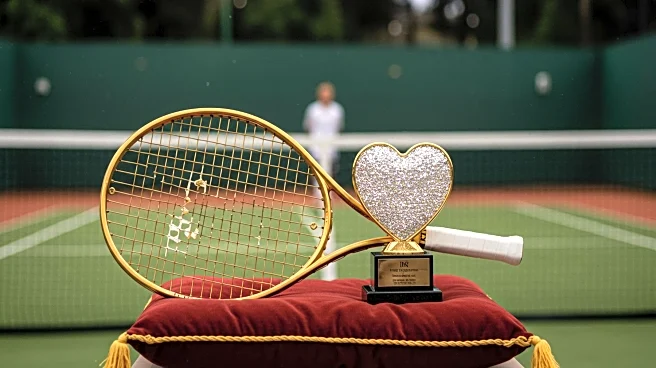What's Happening?
The US Open has introduced a new reality dating show titled 'Game, Set, Matchmaker' during its Fan Week at the Billie Jean King National Tennis Center. The show, produced in collaboration with Fresh Tape Media, features 16 singles paired into eight couples, exploring potential romantic connections while experiencing the US Open. The initiative aims to attract non-traditional tennis fans by tapping into the popularity of dating shows among Gen Z and millennials. The show will be available on the US Open's YouTube channel, offering viewers a blend of tennis and dating entertainment.
Why It's Important?
This innovative approach by the US Open reflects a broader strategy to expand its audience base beyond traditional sports fans. By leveraging the popularity of reality dating shows, the US Open seeks to engage younger demographics, particularly those aged 21 to 44, who are significant consumers of streaming content. This move could potentially increase viewership and attendance at the tournament, enhancing its cultural relevance and commercial appeal. The initiative also highlights the evolving nature of sports marketing, where entertainment and sports intersect to create new engagement opportunities.
What's Next?
The US Open plans to continue integrating social media and influencer marketing to promote 'Game, Set, Matchmaker.' Attendees are encouraged to share their own love stories using the hashtag 'LoveAtTheUSOpen,' further amplifying the show's reach. The success of this venture could lead to more such collaborations in the future, as sports organizations seek innovative ways to attract diverse audiences. The reception of the show will be closely monitored, with potential adjustments to format and content based on audience feedback and engagement metrics.
Beyond the Headlines
The introduction of 'Game, Set, Matchmaker' raises questions about the balance between maintaining the integrity of traditional sports events and embracing modern entertainment trends. While the US Open aims to preserve its prestige, it also acknowledges the need to adapt to changing consumer expectations. This development may influence other sports organizations to explore similar strategies, potentially reshaping the landscape of sports entertainment. The ethical implications of blending sports with reality TV formats could spark discussions on the commercialization of sports and its impact on cultural values.









